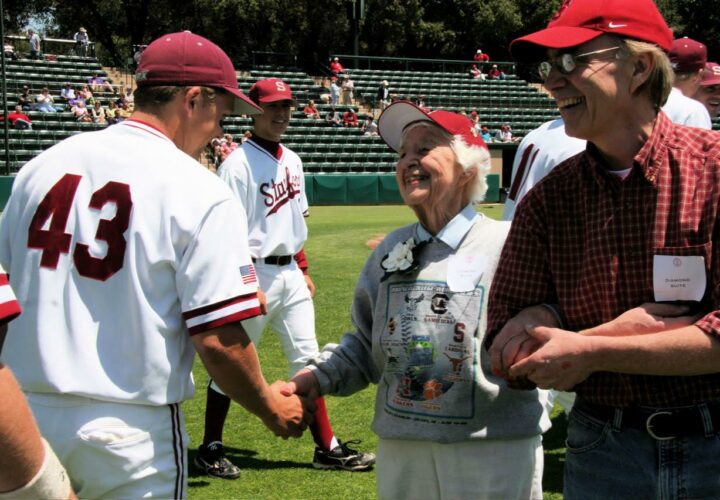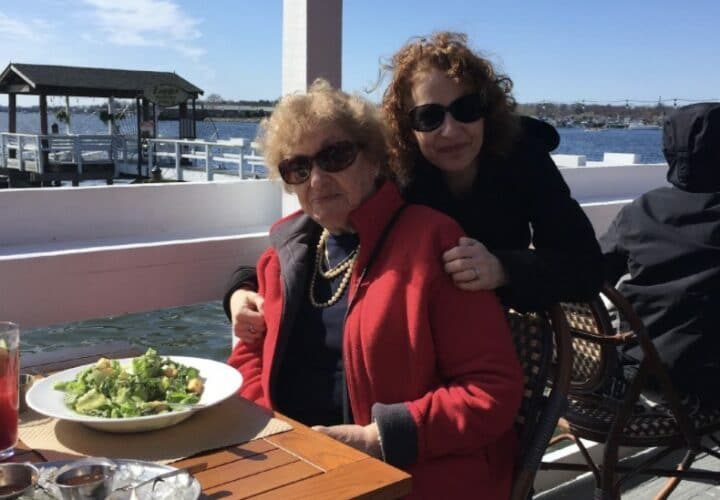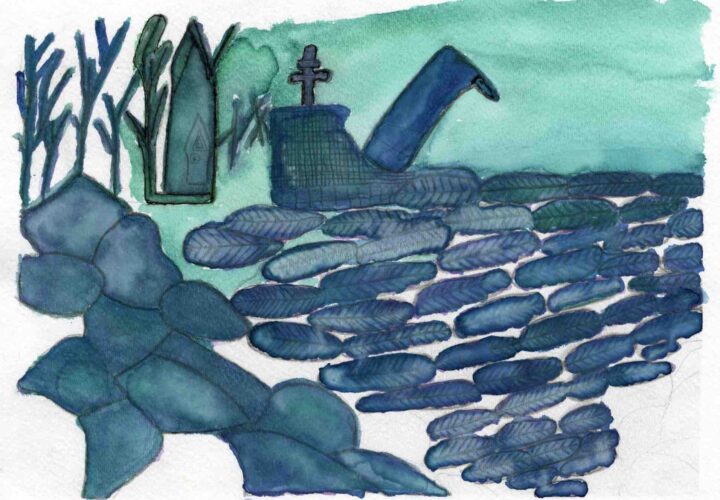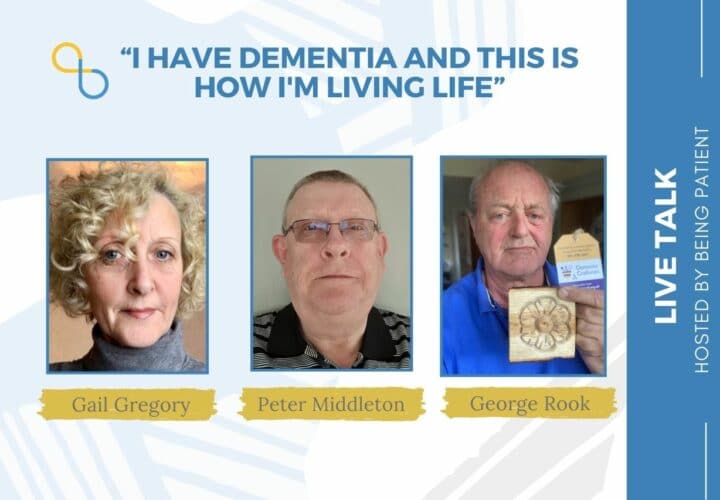Image: Adelaide Iverson (middle), who was 94 years old at the time, and Dave Iverson (right) after Adelaide was invited to throw the opening pitch at a Stanford baseball game.
Writer Dave Iverson discusses ‘life’s final journey’ with his mother, Adelaide, who lived to 105 — and the lessons he learned from those who embodied what caregiving truly means.
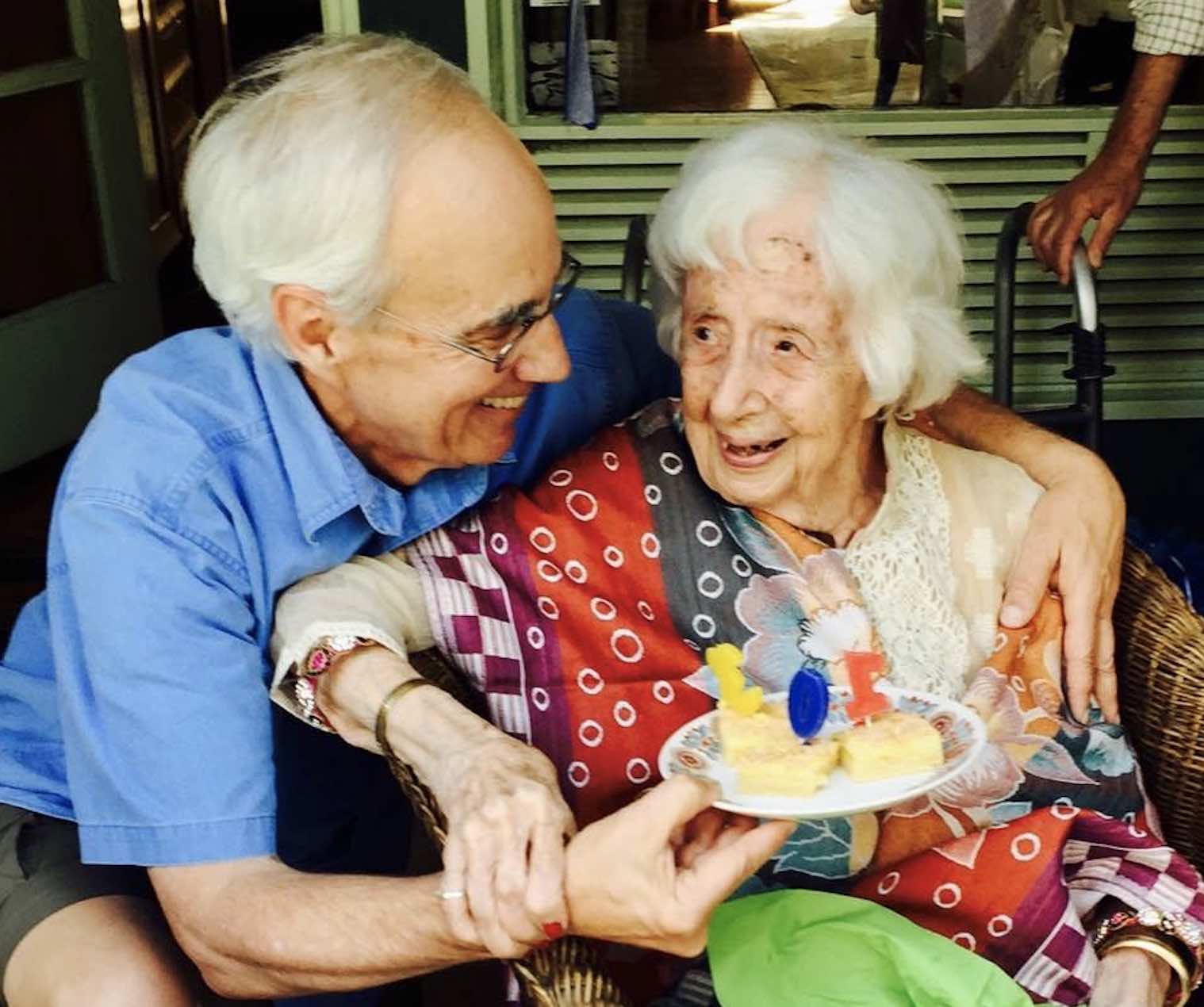
As Dave Iverson reflects on his experience caring for his mother Adelaide Iverson, he finds gratitude in having accompanied his mother through her journey with dementia — even while he himself navigated a diagnosis of Parkinson’s disease.
Along this path of love and loss, he drew strength from those around Adelaide — like her professional caregivers, who looked after her with care, patience and kindness.
In his new memoir, Winter Stars: An Elderly Mother, an Aging Son, and Life’s Final Journey (March 2022), Dave pays homage to Adelaide, their family, and her immigrant caregivers for all they gave.
In a LiveTalk with Being Patient, Iverson speaks about his 10-year caregiving journey, his own diagnosis of Parkinson’s three years before becoming Adelaide’s care partner, and the lessons he learned from the women who helped care for his mother. In 2017, Adelaide died at the age of 105, in her home at Menlo Park, California.
Being Patient: Tell us a little bit about your mother.
Dave Iverson: The best way to think of my mom is as someone who got up every morning and said, ‘Okay, what can I get done today?’ She was very much a take charge person and she was always active. She was an extremely bright person. She was really about action more than anything else.
She graduated from high school and college early [and] at the top of her class in both. She became a teacher, then after she married, she raised a family of three sons.
She was very active in her community, everything from the League of Women Voters and registering voters to tutoring in the county jail. She was a passionate sports fan. She was always on the go, and she remained incredibly active until very late in life.
I only moved to take care of her when she was 95. She’d been able to live independently for 13 years after my dad had died. She was a real pistol. People always used to refer to her as a force of nature, and she was.
Being Patient: Before you moved in to your childhood home to take care of Adelaide, you were diagnosed with Parkinson’s disease. Can you share with us your early symptoms of Parkinson’s and how you felt about your diagnosis?
Dave Iverson: My father was diagnosed in 1971 right after I graduated from college. Like a lot of people, I didn’t even know what the words meant. When my mom wrote me a letter and said, ‘Your dad’s been diagnosed with Parkinson’s,’ I didn’t know what that was. I had to look it up.
My dad was among the first who received what is still the gold standard medication for Parkinson’s: carbidopa/levodopa. He really did quite well on that medication for many years, so I can’t say I worried about it a huge amount until about 20 years later when my older brother was diagnosed. Then you start to think, ‘Okay, what’s going on here?’
The first thing I remember happening to me was I felt this kind of tingling sensation in my leg. At first, I thought it was my cell phone vibrating, only I’d reached for my phone and my cell phone wasn’t vibrating. Then I noticed that when I walked, my left arm wasn’t swinging the same as my right. I remembered that being an early symptom of my dad’s.
Then, I went and saw my primary provider — my internist — and he spent a lot of time talking with me, examining me, and he said at the end of that discussion, ‘I don’t know. You’re going to have to see a movement disorder specialist, but I think it’s likely that you have Parkinson’s.’
The official diagnosis, which is always based on a clinician’s observations [and] there’s no blood test or scan that definitively determines Parkinson’s, only would come a year later. But I think because my dad and my brother had done reasonably well, I felt like, ‘I’m going to just do this as well as I can.’

The very first thing I actually did was to join my neighborhood gym, not because I knew anything about the value of exercise in Parkinson’s which we now know much more about some 17 years later, but just because I remember feeling like I want to stay in charge of my own body as long as I can; I want to do whatever I can to be strong, and hope that the research moves along so that by the time I’m in rougher shape, I’m still pretty fit. [It] turned out [to be] a really smart thing to do.
[It] also turned out that I was extremely lucky. Here I am, all these years later, and I’m still doing really, really well, which is just testimony to how extraordinarily varied a condition Parkinson’s can be.
The thing I worried about the most wasn’t so much movement as it was cognition, because I saw by then what had happened to my dad. My dad had passed away well before I was diagnosed, but I knew what his final years were like, and how much cognitive decline he experienced. I also worried about my voice because I’d spent my life in broadcast journalism. Being able to speak was something that was near and dear to me. Again, I’ve been very fortunate in the way in which that’s progressed.
But I can speak more about how that also entered into my thinking about caring for my mom, because many people find that to be a bit of a head scratcher: Why would I decide to do that, given my own diagnosis a few years before?
Being Patient: Please, go ahead — why become her caregiver, given your own diagnosis?
Dave Iverson: Some of it was I think what many people with a neurological condition feel, which is you still want to feel like you can do stuff. My mom was really my first example of what it means to care for someone.
She was incredible with my dad, especially during his last years with Parkinson’s. She really showed me not just what caregiving [means], but really what love means.
I felt like, ‘My mom and I are really close. We get along really well. I’m nearby. My life is full. I’m working full-time but I have flexibility. I can do this, which of course was incredibly naive.’ But it was really this desire to want to do this, because I felt I could, because of what my mom had done.
In some ways, I almost felt like it was part of our family story, and that by living with my mom, I could learn that much more about my dad and his life experience. In an odd way, it became kind of aligned: That very time was also when I was starting to work on the film I made for the PBS Frontline series called My Father, My Brother and Me. It was this kind of curious intermingling of personal experience and in some ways professional discipline and family life.
Being Patient: You found that you actually weren’t fully aware of all the reasons for why you decided to care for your mother, you wrote. But you eventually realized that you needed help too. What do you mean by that?
Dave Iverson: My mom’s needs were very evident. She needed someone who could cook for her, who could help her get dressed, who could help her in the bathroom, who could be with her at night and on the weekends when we didn’t have care providers there [and it was just me there], although I would add more help over time.
What I didn’t really understand was that I kind of needed some help too. By that, I mean this: It’s just my belief that I think sometimes we’re drawn to doing exactly what we want to do and need to do for reasons we don’t fully even understand. I just felt like, ‘This is what I want to do.’ It was one of those moments where you feel like, ‘I know what I’ve got to do,’ and you can’t necessarily even articulate why.
What I came to feel in time was that maybe that’s not an accident, maybe I wound up in this position precisely because I needed some assistance. By that, I mean that caregiving reveals your shortcomings like nobody’s business. I think I write in the book that it’s like a heat-seeking missile. It seeks out and pierces your vulnerabilities. Mine were aligned with what a lot of caregiving demands.
I like being in control. I like being in charge. If you’re a caregiver, you are so not in charge. You are not in control. I’m someone who likes being right. I like being on top of things, explaining my point of view, convincing other people of my point of view and being acknowledged that my point of view is right. That’s also pretty worthless when it comes to being a caregiver, especially for someone who’s cognitively challenged.
It took me a long time for me to understand that it wasn’t helpful for me to correct my mom. I’d just say, ‘No Mom, that didn’t happen,’ or ‘Mom, I’ve already told you that,’ or ‘Yes Mom, you did go to church. You just don’t remember.’ It took me a long time to realize that instead, what we’re really meant to do, I think anyway, is to be present to that person, and try to hear the truth beneath the words.
If my mom were to say something like, ‘I went to law school,’ rather than to say, ‘Mom, you didn’t go to law school,’ which is what I said, it might be better to think of that [as], ‘Mom, are you saying that you wish you’d gone to law school? Are you saying that that would have been kind of a great career? And tell me more about that.’ That would have been a more helpful response because the truth is, in another era, my mom could have gone into law school, probably should have gone to law school, and she would have made one heck of an attorney or politician.
But I think that’s the challenge [that] at least I was slow to come by, and perhaps others who live and care for someone with dementia are too. We need to see and understand them for who they are now, not who they once were or who we want them to be.
I had a lot of growing up, in a way, to do and I think it did help me to marginally get a little bit better at some of those things. That of course was also hugely helped by the caregivers who taught me so much, who taught me so much of what true caregiving truly demands. Without getting all squishy, romantic or religious about it, in the end, I think I was there for a reason, and I’m grateful for that experience.
Being Patient: In the book, you express your deep gratitude for your mom’s professional caregivers, and you wrote that “[W]hen unexpected kindness enters your life at a time when you need it most, it washes over your very being, releasing a wave of gratitude that can carry you through the great swirls of uncertainty that will so often surround you. You begin to realize that you are not entirely alone—not when someone offers the simple but extraordinary act of just being there when it’s needed most.”
Reflect with us on this quote and the people who offered unexpected kindness during your caregiving journey.
Dave Iverson: The caregivers we had were extraordinary. They were all women, all immigrant Americans, all women of color, all women who I think had come to this country with not a lot other than smarts and skill, and in this case, women who understood that caring for the old is kind of part of life and part of life’s bargain.
They taught me so much from the physicality of it because caregiving is very physical. I learned a lot about how to help my mom get dressed, how to help her in the bathroom, how to spoon feed her in a way that would help her, but so much more.
Caregiving often requires you to be at your best and it’s really hard to be at your best. I found it, at least, really hard to be at your best. I’d get frustrated. I’d get angry. I’d get short tempered.
They weren’t. My mom could be snappish with them and they’d just say, ‘Okay, Adelaide,’ and walk right back in the door 10 minutes later with a smile on their face. They were extraordinary and they also had this deep compassion and respect for others. I remember asking Sinai, one of our longtime caregivers, once, how she did this, how did she approach it. She said, ‘I just talk to everyone the way I would talk to someone I love, the way I would talk to my mom.’ They had such gentleness and they also had such skill.
[They] also taught me something much more profound about immigration in this country, which I thought I knew a little bit about and which I had certain usual San Francisco Bay Area progressive thoughts. But I didn’t really understand what it means to have English as your second or third language. I didn’t really understand how sometimes life is different if your skin is brown, or your last name is Taufa, Morales or Latu. They were contending with a lot. One of the things that I came away from this experience feeling so strongly about is how much more we need to do in this country to honor those people, because we do not honor them enough.
Being Patient: Your mother’s professional caregivers not only deepened your understanding of care, but they also made you a better journalist. How so?
Dave Iverson: It now drives me wild when I hear someone say, ‘I’m in favor of immigration, but we just need to make sure that people come to this country who are highly skilled.’ What they mean by that is basically you know, people who can work on high tech or whatever. My response is, ‘Absolutely. We need people who are highly skilled. How about caregivers? That’s a highly skilled profession.
“The caregivers we had were extraordinary. They were all women,
all immigrant Americans, all women of color, all women who
I think had come to this country with not a lot other than
smarts and skill, and in this case, women who understood
that caring for the old is kind of part of life and part of life’s bargain.”
My mom’s skin was perfect almost until the day she died. That does not happen unless you have extraordinary care. Someone who knows the art of taking care of someone’s skin, who knows how to bathe [and] wash [the person’s skin], what ointments work, how to turn the person in the right way. All of that takes great skill; yes, we need skill, especially in a country where someone turns 65 every eight seconds, but those are the skills we need and those are the skills that we need to honor.
Being Patient: What does the book’s title Winter Stars mean?
Dave Iverson: The title comes from a conversation that I had with my mom at the last Christmas we shared together. Even when she was confined to a hospital bed in the last years of her life, she still wanted to be in motion. She still wanted to be active, and she would sort of kick at her hospital [bed’s] guardrails. She was always kind of restless.
But on this particular night when I walked in, I knew right away that there was something different about her, that she seemed calm and peaceful. We just sat there side by side for a while, holding hands.
She said to me, ‘You look wonderful,’ and she said it very clearly, more clearly than she had been able to [speak] in recent months.
I said, ‘You look wonderful too,’ and we just sat there for a while.
Then, I said, ‘We’re a good pair Mom.’
She said, ‘What a pair.’
Then she looked at me and she said, ‘I feel lucky.’
I said, ‘I feel lucky too. I feel lucky for all you’ve given me.’
Then, she said it again. She said, ‘I feel lucky.’
So, I said, ‘Can you tell me why, Mom?’
There was a long pause, and then she looked at me with eyes as bright as winter stars, and she said, ‘Because there’s love all around.’
I knew, in that moment, that while my mom would live for many more months, and that our time was unfinished, her journey in a way was now complete. That we’ve gone through all of our bouts of anger and frustration, but we had found our truest selves in the end, our truest selves as mother and son, and that being able to be with her had allowed me to be at the bedside of someone I loved, and to hear this great and wonderful truth that there really is love all around.
Being Patient: I’m sure it was so affirming for you to hear those words from your mother.
Dave Iverson: We were affirming each other in a way, I think. That was a great gift that I will always carry with me, and she wasn’t just talking about me. She was talking about Eileen and Sinai (her professional caregivers) and the rest of our family. That’s something we’re fortunate enough to all know, and that’s part of why I wanted to try to share this story as well.
All photos courtesy of Dave Iverson.
The interview has been edited for length and clarity.
Contact Nicholas Chan at nicholas@beingpatient.com
